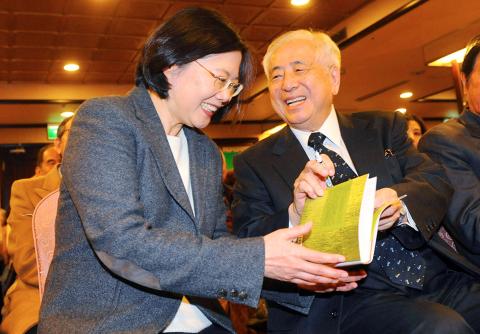The man likely to become the new prime minister of Japan, Shinzo Abe, could turn out to be Taiwan’s biggest enemy if Taipei chooses to maintain the pro-China stance it has adopted under President Ma Ying-jeou’s (馬英九) administration, former representative to Japan Koh Se-kai (許世楷) said yesterday.
Known for his friendliness toward Taiwan, Abe has also been aware of Taipei’s gradual tilting toward Beijing, which poses a strategic threat to Japan, Koh said at the launch of his new book yesterday.
“Abe is one of Taiwan’s most trustworthy Japanese allies. However, I’d say the length of that friendship will be determined by which path Taiwan chooses to walk on: the pro-China path or the pro-US-Japan one,” said Koh, who served as Taiwan’s top diplomat to Japan between 2004 and 2008.

Photo: CNA
The solid relationship between Japan and Taiwan that Koh established during his diplomatic career has started to crack under Ma’s pro-China administration, as evidenced by Japan’s initiative to expand its air defense identification zone (ADIZ) on Yonaguni Island, Japan’s westernmost island about 110km from Hualien County.
Koh said that Japan has proposed expanding its ADIZ to include the western half of the island, which has been under the jurisdiction of Taiwan’s ADIZ, twice in June 2010 and this year, a move which suggested that Tokyo is concerns about Taipei’s strategic stance.
The Taiwan Relations Act, which the US Congress passed in 1979, and the US-Japan Treaty of Mutual Cooperation and Security are two of the most important legal documents for Taiwan in terms of security, he said, adding that the Ma administration should be cautious in choosing which partnership would best serve the nation’s interests.
Commenting on the challenges Abe would face if he becomes prime minister, Koh said that Abe will have to reinvigorate Japan’s slow economy, resolve the escalating dispute over the country’s use of nuclear power as well as make a decision on whether to raise the consumption tax, a policy championed by the previous administration.
However, the potential policy which is being watched most attentively by international and domestic observers is Abe’s wish to amend the Japanese constitution, in particular Article 9, which is a pacifist clause that renounces war and the use of force, Koh said.

Taiwan would welcome the return of Honduras as a diplomatic ally if its next president decides to make such a move, Minister of Foreign Affairs Lin Chia-lung (林佳龍) said yesterday. “Of course, we would welcome Honduras if they want to restore diplomatic ties with Taiwan after their elections,” Lin said at a meeting of the legislature’s Foreign Affairs and National Defense Committee, when asked to comment on statements made by two of the three Honduran presidential candidates during the presidential campaign in the Central American country. Taiwan is paying close attention to the region as a whole in the wake of a

President William Lai (賴清德) has appointed former vice president Chen Chien-jen (陳建仁) to attend the late Pope Francis’ funeral at the Vatican City on Saturday on his behalf, the Ministry of Foreign Affairs said today. The Holy See announced Francis’ funeral would take place on Saturday at 10am in St Peter’s Square. The ministry expressed condolences over Francis’ passing and said that Chen would represent Taiwan at the funeral and offer condolences in person. Taiwan and the Vatican have a long-standing and close diplomatic relationship, the ministry said. Both sides agreed to have Chen represent Taiwan at the funeral, given his Catholic identity and

Chinese Nationalist Party (KMT) Chairman Eric Chu (朱立倫), spokeswoman Yang Chih-yu (楊智伃) and Legislator Hsieh Lung-chieh (謝龍介) would be summoned by police for questioning for leading an illegal assembly on Thursday evening last week, Minister of the Interior Liu Shyh-fang (劉世芳) said today. The three KMT officials led an assembly outside the Taipei City Prosecutors’ Office, a restricted area where public assembly is not allowed, protesting the questioning of several KMT staff and searches of KMT headquarters and offices in a recall petition forgery case. Chu, Yang and Hsieh are all suspected of contravening the Assembly and Parade Act (集會遊行法) by holding

Lawmakers from the Democratic Progressive Party (DPP) yesterday established a friendship group with their counterparts in Ukraine to promote parliamentary exchanges between the two countries. A ceremony in Taipei for the Taiwan-Ukraine Parliamentary Friendship Association, initiated by DPP Legislator Chen Kuan-ting (陳冠廷), was attended by lawmakers and officials, including Deputy Minister of Foreign Affairs Francois Wu (吳志中) and European Economic and Trade Office in Taiwan Director Lutz Gullner. The increasingly dire situation in Ukraine is a global concern, and Taiwan cannot turn its back when the latter is in need of help, as the two countries share many common values and interests,